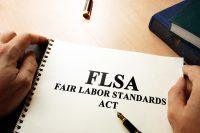U.S. Supreme Court Clarifies That Employers Are Not Required to Meet Heightened Standard of Proof to Establish an FLSA Exemption Applies
Employers do not need to meet a heightened standard of proof to establish an exemption from the minimum wage and overtime requirements under the Fair Labor Standards Act (FLSA), the U.S. Supreme Court ruled in E.M.D. Sales, Inc. v. Carrera, No. 23-217 (Jan. 15, 2025). In a unanimous decision, the Supreme Court clarified that employers […]










